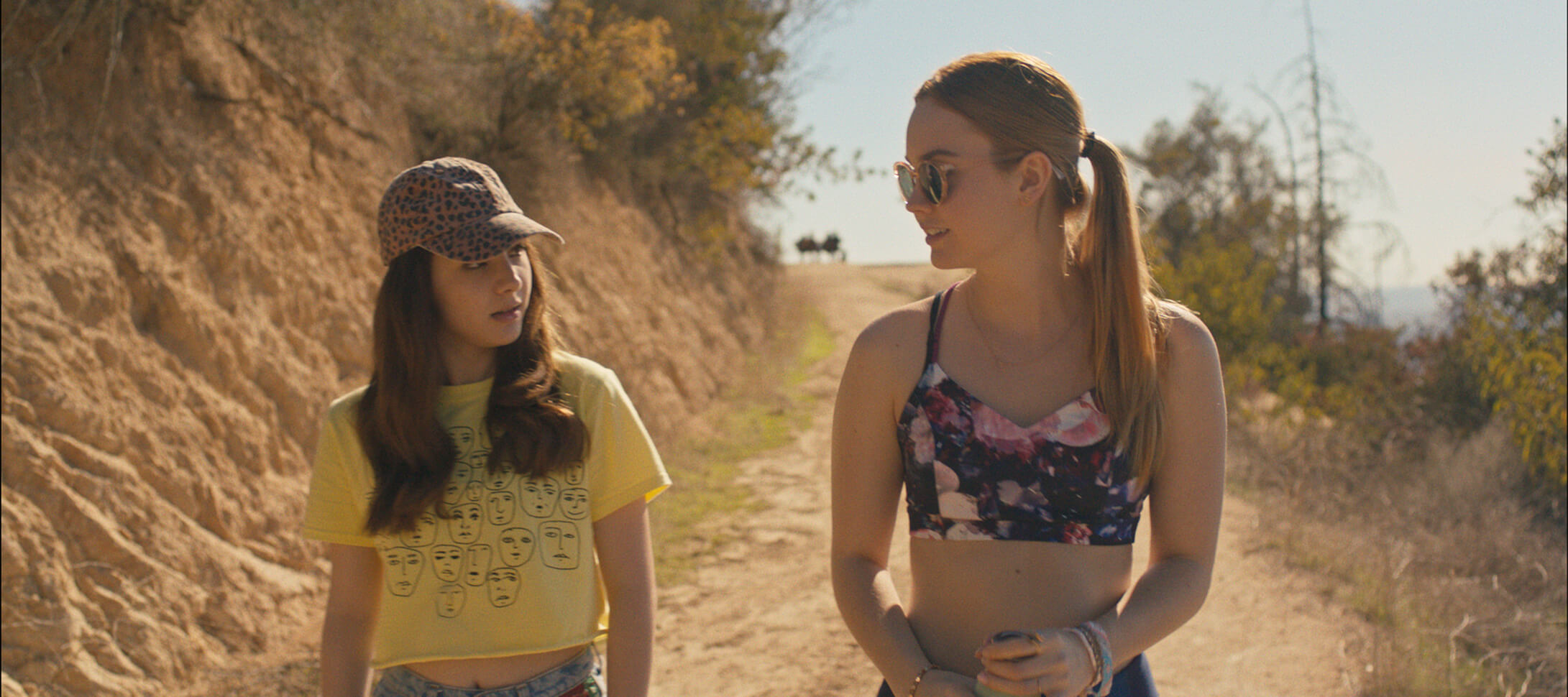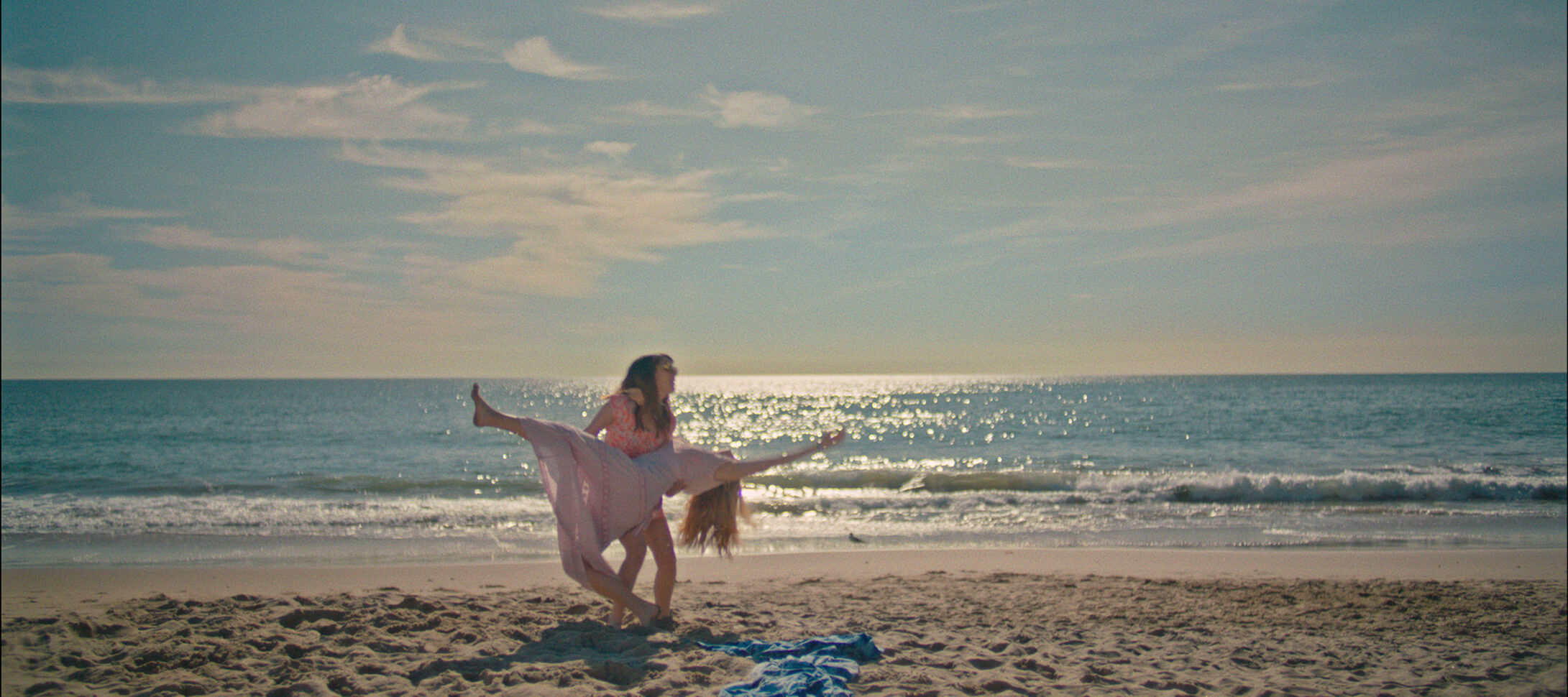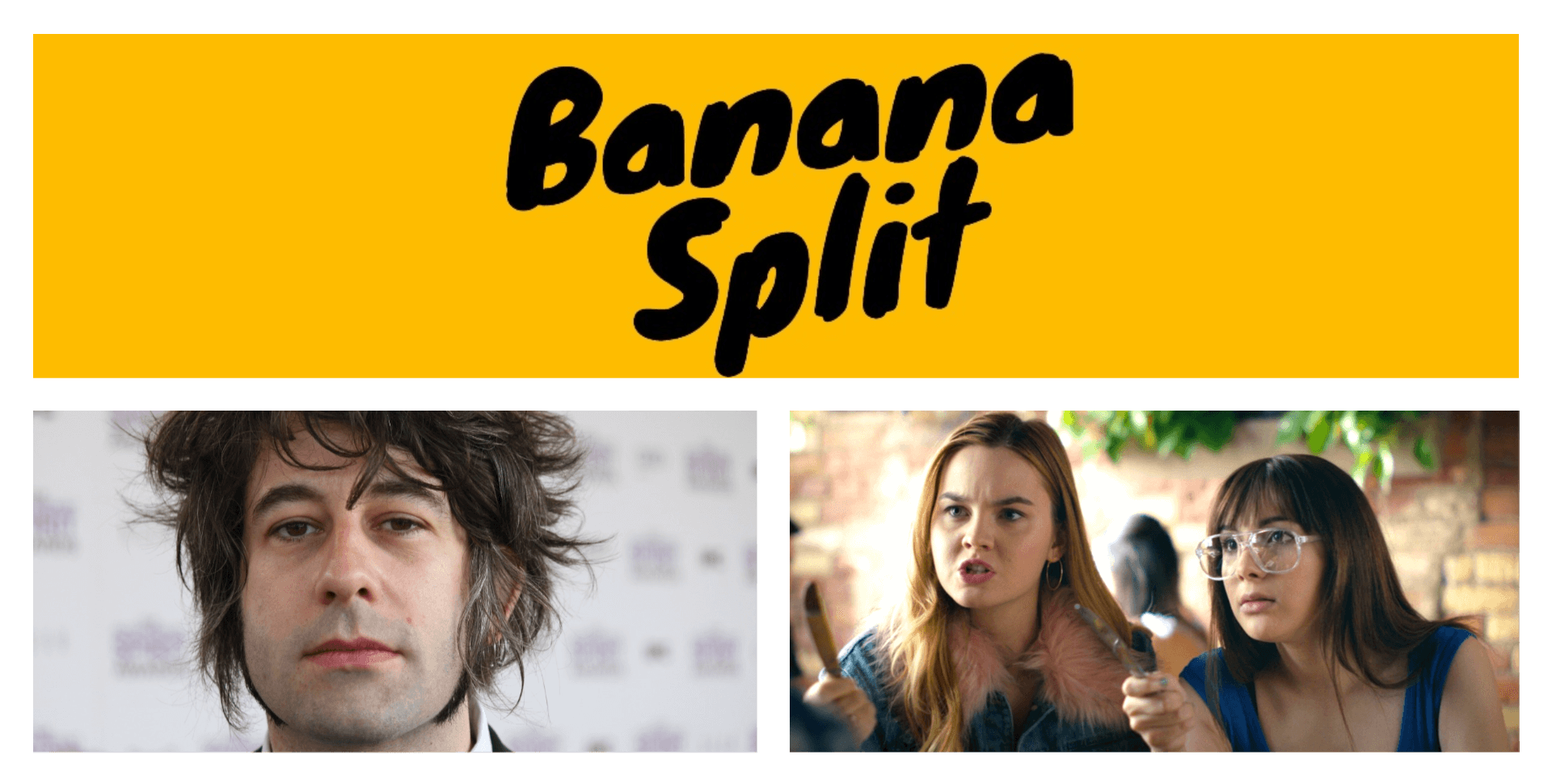Director Benjamin Kasulke's feature film, 'Banana Split' is a comedy about two teenage girls (ex-gf and new-gf) who have romantic feelings for the same guy and decide to engage in a friendship fling without his knowledge. Co-written by Hannah Marks and Joey Power, the delightfully witty movie features Marks as the lead and ex-girlfriend April, Liana Liberato as the new girlfriend Clara and Dylan Sprouse as Nick, the guy at the top of the romantic triangle.
Banana Split (Vertical Entertertainment) is now availiable
to stream On Demand and Digital, starting March 27, 2020.
Watch Banana Split via Amazon

Co-written by Hannah Marks and Joey Power, Banana Split serves hilarious quotables, relatable teenage angst and uplifting moments of two teenage girls trying to navigate through their complicated feelings of becoming close friends, while still having romantic feelings for the same guy. Can you tell us how it was working with Marks and Power?
Yeah totally. Hannah and Joey have a lot of experience together both as co-writers and co-directors they’ve written a bunch stuff by the time I've-- I mean I've known Hannah a long time but by the time I met Joey and worked as them as partners they had a lot of time underneath their belt working together. You know they both as really successful screenwriters and they went off this tail end of co-directing a feature, that’s a pretty intimate kind of collaboration. So it was nice to know that...you know sometimes you see collaborators when you meet them that they’ve worked together once and never speak again. And Hannah and Joey have been at it for a long time. So I knew that they were capable of like a deep long term collaboration and could make things work and be in the tick and the thin of it. I felt really lucky walking into a situation that was some kind of like a veteran, old friend. And they were great to work with as for as like--I had some notes on the screenplay and they were really open to my ideas. Hannah and Joey, they were both on set the whole time so we had a wonderful resource in them in that they knew this screenplay inside out because they’ve lived with it for about four years before I was even involved. So I had these sort of wonderful resources. Not only were they in a spot to be very specific about the ideas that the screenplay was dealing with, but they were also really wonderful about being flexible with new directions that the story could take based on actors who get cast or personal experiences with the people involved with the story or something as simple as - we found a really good location that wasn’t in the screenplay, like when the girls go to share the actual banana split together, that was a sound location, that just encouraged a re-write a scene that made more sense for the movie in the end. It was nice to have people that at once were flexible and open to ideas but also specific about the larger concepts that the story was about and had worked together for so long that they really trusted each other and had a shorthand.
What was the casting process like for Banana Split?
Sure. Yeah the casting for Banana Split was—you know I worked with Amey René who’s an old friend I knew from her Seattle days. I’ve worked with her for quite a bit since, she’s great. We knew that Hannah would play the lead she had always written April as a stylized version of herself. And Hannah had dealt with a sort of autobiographical situations in her life years ago that sort of became the sparking instance for the story that became Banana Split. So we knew that Hannah would become out lead and we were building the cast around her. Hannah had always had daydreams of Liana Liberato playing Clara and Liana is a very busy actress just like Hannah is, so getting their schedules to line up was really tough, but we got really lucky that Liana had become available. And Hannah and Liana were really old friends so they had years, they were children together, so they had years of life experience to draw from and build the dramatic version of their relationship for the screen. And after we found them, we needed to find Nick, the boy that brings them together. We talked to a lot of people, we auditioned a lot of people, and then Dylan’s name popped up. I’m a little older than the Zack and Cody crowd so I just didn’t know him. We all jumped on a Skype call, Joey, Hannah, and myself with Dylan. He was really cool, I liked that he had a whole career that he stopped and went to school and he’s doing other stuff now. He’s got this mead brewery in Brooklyn. And he’s got this whole other life-what was cool to me was that he was picking his projects and doing things that he was interested in. And I didn’t know that he’d be interested in this at all but it had turned out that Dylan had done a film called Dismissed with a friend of mine, Kent Osborne. And Kent loved Dylan, and once I told Kent that we were interviewing Dylan, he called Dylan so Dylan knew that I knew Kent and like one thing just sort of lead to another, and was like I wasn’t just some random guy that wanted something from him. And I think for Dylan it was kind of nice to have someone that didn’t know, that wasn’t like a fan of the Suite Life, that didn’t think he was a young kid actor anymore. I just met him as a guy who was doing cool stuff. So him and Haley Ramm who played Sally, one of April’s friends, is an old friend of Liana and Hannah. We did some auditions for Molly who is played by Meagan Kimberly Smith but she kind of came out of nowhere, she’s a New York-based actress who went to school in North Carolina School of the Arts with some friends of mine way back in the day. And then, Jessica Hecht who plays the mom, I’ve worked for years with on a show called “Red Oaks” on Amazon, I was a cinematographer on that show and I’ve always really loved her, I thought she could play a good mom to Hannah and then to Addison Riecke who plays Agnes, the younger sister. Everyone always asks about Agnes. We talked with a lot of people and Agnes was the only take we looked at because it was so good, it was such a home run that came out of nowhere. Hannah knew her work a little bit, she was sort of a Nickelodeon kid and Hannah and Addison shared the same manager and so one thing led to another and we were able to work with her between her time on Nickelodeon shows.

Photo courtesy of Vertical Entertainment
Which scenes did you find the most rewarding and most challenging on the set and also during post-production?
Probably the one thing that was sort of the monster for us on set was—is the thing that most directors and cinematographers and editors all sort of dread which is four people around a dinner table with a lot of comedy and drama happening at the same time - there's one scene where Clara comes home with April to meet her family and sort of right after they told each other that they’re each other’s best friends and there’s a lot of tension between Agnes, April’s younger sister, and Clara. Some fights start to erupt and Susan their mother tries to calm everyone down. And it’s just one of those things where everybody seems very simple on paper but I think we shot seventeen different camera positions for that one three minute scene. I knew it was going to be hard when we got into it, it was the beginning of the day. I talked to the whole crew and I talked to the cast “we’re going to be doing this a lot, I’m really, really sorry but I promise that it’ll pay off later.” And when we got to the edit, we used almost every single one of those camera placements. It’s just one of those things where you’re doing the same thing for an entire day and everyone was wonderful about it, but you know it’s a lot of repetitive work. But this scene, it shows well. It cut together really well. It just was one of those things where on a bigger budget movie or a bigger TV show maybe everybody would be like “ok, this is what we’re doing today,” but on a small indie movie it’s rare that you’re around the same dinner table all day long for an entire day.
How was the experience of working with cinematographer Darin Moran to devise the visual aesthetic for the film?
Yeah, I got lucky that Darin Moran was able to jump on as a cinematographer. I think it’s hard for any cinematographer to dive into, it’s always exciting to dive into a new collaboration, but it’s a little daunting when the collaboration is with another cinematographer. I think there’s not a lot of places in the film industry where two cinematographers are working together at the same time. And where one is sort doing second unit work or a films primary DP. Darin and I had not met before. He and I talked a lot on Skype when I was interviewing cinematographers. He and I both are big-time surfers and he was up in Portland, Oregon and I spent a lot of adult years in Seattle. I live in Los Angeles now, but he and I sort of came out of the same living situations, we kind of knew that world, and we both surfed a lot, kind of knew that world, and Darin really, working right of the gate understood the need for the film to feel very natural, and to feel like, you know, it could be pretty, it could be beautiful, but it needed to be fully grounded in a world that felt accessible and it felt like the kind of story that could be happening to people that you know. So he and I talked a lot going into it about how you know the cameras couldn’t be too flashy, and the lighting couldn’t be too flashy. And at any point where we felt that someone would recognize the cinematography over the story, or over the performance, anytime that that would have happened we would have made a huge mistake. So I think that Darin really understood restraint and he still was able to make a beautiful image. A lot of our conversations were about that. And we had a lot of talk about as far as being men telling a story about young women, and what that means as far as where you place the camera, how you light somebody and what somebody looks like and are we exploiting somebody, you know? There’s just a lot of things to think about. We didn’t want to make a story about strong women sort of prioritizing a female friendship and kind of put our feet in our mouth as far as planning it the wrong way and just kind of taking a cheap shot, you know?

Photo courtesy of Vertical Entertainment
What do you hope audiences will take away from the film?
I hope people watch it and I hope a) they relate to it. I had a lot of friends and even total strangers watch it and come up to me after watching it and say “this totally happened to me, I was dating a guy, I thought he was dating somebody else and then we were just like forget that guy and that’s how I met my best friend” that happens more than you might think it does. But I hope that, you know, it’s a coming of age story and I think that anybody, I would hope would watch it, would see that as you grow up, relationships get a lot harder and prioritizing certain types of relationships is actually more difficult in the short term and a lot better for you further down the line. I hope that people watch this and see that it’s kind of worth the struggle to grow up. As much as it’s not fun, it’s going to happen and if there’s a time to sort of take control of your life it should be when it’s at its most difficult because it’s going to help you later on.
What films/directors have had the biggest impact on your filmmaking and for your feature film, Banana Split and why?
For the feature Banana Split, the two biggest ones for me are -- well John Hughes wrote but Howard Deutch directed, “Some Kind of Wonderful” which came out in 1987, it’s about another type of love triangle, it’s a girl who’s in love with her friend who’s a guy and the guy’s sort of oblivious to it and tries to make a move on the smart, popular girl at school, and that was written by John Hughes. I grew up on sort of a tail end of generation X and John Hughes was really, pretty influential as far as how teenage life was like, especially in America when I was young. For people that were like a little bit older than me, it really resonated and I grew up on that and revisiting it now, there are a lot of good things I pull from it. There’s a lot of stuff I don’t agree with, but he’s incredible. And then Amy Heckerling is an old friend that I’ve worked with a lot on a show called “Red Oaks.” She did “Fast Times at Ridgemont High” which was another sort of teen film, that kind of very seriously takes into consideration the sort of emotional lives of young teenagers and gives them a voice in a way maybe you don’t see as much on, like on a sitcom. So those two in particular for Banana Split, but in life and out the world I’m a huge fan of Hal Ashby a lot of his films resonate with me.
What's next for you?
Right now, I’m in post-production, I directed a mini-part interactive series called Owl Moon, it’s about musicians in 1974 in Laurel Canyon in LA trying to make their next record and it’s sort of a choose your next adventure movie. It’s got a lot of really fun musicians in it. It’s got the brothers from the Lemon Twigs, James Jagger, and a lot of really good music in it. It’s going to be pretty fun. That’s going to come out—we're aiming for early fall; we’ll see what happens with that. And then reading tons of scripts, trying to figure out what the next thing to do is. I’m still shooting all the time.

